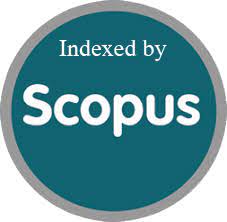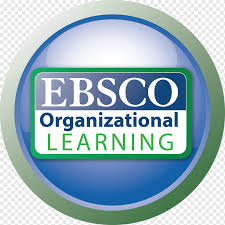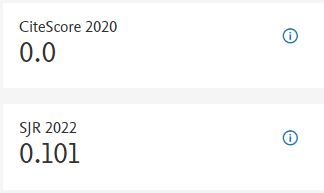ANTECEDENTS OF STUDENTS’ INTENTION TOWARDS SOCIAL ENTREPRENEURSHIP IN GUJARAT: EXTENSION OF THEORY OF PLANNED BEHAVIOR
DOI:
https://doi.org/10.7492/fhsbj147Abstract
The govt. of any nation is closely monitoring social entrepreneurship, an emerging area in HE (higher education) learning, especially since its growth has started to gain more and more substantial impetus. Considering this, the present study seeks to identify different factors affecting undergraduate and postgraduate students' intentions to engage in social entrepreneurship in the Gujarat by applying a well-established theory of planned behavior (TPB) as a theoretical framework.
References
Ajzen, I. 1991. “The Theory of Planned Behavior.” Organizational Behavior and Human Decision Processes 50 (2): 179–211.
Ajzen, Icek, and Martin Fishbein. 1970. “The Prediction of Behaviour from Attitudinal and Normative Variables.” Journal of Experimental Social Psychology 6 (4): 466–87. doi:10.1016/0022-1031(70)90057-0.
Anderson, J. C., & Gerbing, D. W. (1988). Structural equation modeling in practice: A review and recommended two-step approach. Psychological bulletin, 103(3), 411-423.
Appolloni, A., and S. Gaddam. 2009. “Identifying the Effect of Psychological Variables on Entrepreneurial Intentions.”
Arbuckle, J. L. (2006). Amos (version 7.0) [computer program]. Chicago: SPSS.
Armitage, C. J., and M Conner. 2001. “Efficacy of the Theory of Planned Behaviour: A Meta-Analytic Review.” The British Journal of Social Psychology 40 (4): 471–99. doi:10.1348/014466601164939.
Armitage, C. J., and M Conner. 2001. “Efficacy of the Theory of Planned Behaviour: A Meta-Analytic Review.” The British Journal of Social Psychology 40 (4): 471–99. doi:10.1348/014466601164939.
Austin, J., H. Stevenson, and J. Wei-Skillern. 2006. “Social and Commercial Entrepreneurship: Same, Different, or Both?” Entrepreneurship Theory and Practice 30 (1): 1–22.
Bagozzi R, Yi Y (1988) On the evaluation of structural equation models. J Acad Mark Sci 16:74–94.
Bagozzi R, Yi Y, Phillips, W. (1991) Assessing construct validity in organizational research. Adm Sci Q 36:421-458.
Bandura, A. (1986), Social Foundation of Thought and Action: A Social Cognitive Theory, Prentice-Hall, Englewood Cliffs, NJ.
Bird, B. (1988), “Implementing entrepreneurial ideas: the case for intention”, Academy of Management Review, Vol. 13 No. 3, pp. 442-453.
Bornstein, D., and S. Davis. 2010. Social Entrepreneurship. What Everyone Needs to Know. Oxford: Oxford University Press.
Byrne, B. M. (2001). Structural equation modeling with AMOS, EQS, and LISREL: Comparative approaches to testing for the factorial validity of a measuring instrument. International journal of testing, 1(1), 55-86.
Campo, J.L.M. (2010), “The propensity for entrepreneurship: psychological and social factors”, The Propensity for Entrepreneurship: Psychological and Social Factors, Vol. 6 No. 10, pp. 51-76.
Carsuard, Alan, and Malin Brannback. 2011. “Entrepreneurial Motivations: What do We Still Need to Know?” Journal of Small Business Management 49 (1): 9–26.
Chancel, L., and T. Piketty. 2019. “Indian Income Inequality, 1922–2015: From British Raj to Billionaire Raj?” Review of Income and Wealth 65 (S1): S33–S62. doi:10.1111/roiw.12439.
Corner, P.D. and Ho, M. (2010), “How opportunities develop in social entrepreneurship”, Entrepreneurship Theory and Practice, Vol. 34 No. 4, pp. 635-659.
Doan, W., Jeff, V. and Ehrhardt, K. (2011), “An organizing framework for entrepreneurial intentions research: an integration and extension of dominant intent-based models using social cognitive career theory”, USA: Small Business Journal, Vol. 12.
Ernst, K. 2011. “Heart Over Mind–An Empirical Analysis of Social Entrepreneurial Intention Formation on the Basis of the Theory of Planned Behavior.” Unpublished diss., University Wuppertal.
Estrin, S., T. Mickiewicz, and U. Stephan. 2016. “Human Capital in Social and Commercial Entrepreneurship.” Journal of Business Venturing 31: 449–467.
Fornell, C., & Larcker, D. F. (1981). Structural equation models with unobservable variables and measurement error: Algebra and statistics. Journal of marketing research, 18(3) 382-388.
Hair, J.F., Anderson, R.E., Tatham, R.L. and Black, W.C. (1998), Multivariate Data Analysis, 5th ed., Macmillanm, New York, NY.
Hair, J.F., Black, W.C., Babin, B.J. Anderson, R. E. 2009. Multivariate Data Analysis, Seventh ed. Person Education, London.
Hechavarr_ıa, D. M., A. Ingram, R. Justo, and S. Terjesen. 2012. “Are Women More Likely to Pursue Social and Environmental Entrepreneurship.” In Global Women’s Entrepreneurship Research: Diverse Settings, Questions and Approaches, edited by K. D. Hughes and J. E. Jennings, 135–151. Cheltenham: Edward Elgar.
Hockerts, K. 2015. “The Social Entrepreneurial Antecedents Scale (SEAS): A Validation Study.” Social Enterprise Journal 11 (3): 260–280
Jean Paolo G. Lacap, Hendrati Dwi Mulyaningsih, Veland Ramadani, (2018) "The mediating effects of social entrepreneurial antecedents on the relationship between prior experience and social entrepreneurial intent: The case of Filipino and Indonesian university students", Journal of Science and Technology Policy Management
Kistruck, G. M., and P. W. Beamish. 2010. “The Interplay of Form, Structure, and Embeddedness in Social Entrepreneurship.” Entrepreneurship Theory and Practice 34 (4): 735–761.
Ko¸co_glu, M., and M. U. Hassan. 2013. “Assessing Entrepreneurial Intentions of University Students: A Comparative Study of Two Different Cultures: Turkey and Pakistani.” European Journal of Business and Management 5 (13): 243–252.
Krueger, N. F., and D. V. Brazeal. 1994. “Entrepreneurial Potential and Potential Entrepreneurs.” Entrepreneurship Theory and Practice 18: 91–91.
Krueger, Norris F., Michael D. Reilly, and Alan L. Carsrud. 2000. “Competing Models of Entrepreneurial Intentions.” Journal of Business Venturing 15 (5–6): 411–32. doi:10.1016/S0883-9026(98)00033-0.
Li~n_an, F. 2004. “Intention-Based Models of Entrepreneurship Education.” Piccolla Impresa/Small Business 3 (1): 11–35.
Li~n_an, F. 2007. “13 The Role of Entrepreneurship Education in the Entrepreneurial Process.” Handbook of Research in Entrepreneurship Education 230.
Li~n_an, Francisco. 2004. “Intention-Based Models of Entrepreneurship Education.” Piccolla Impresa/Small Business 3: 11–35. http://congreso.us.es/gpyde/DOWNLOAD/a9.pdf.
M., Fink. 2013. “Robustness of the Theory of Planned Behaviour in Predicting Entrepreneurial Intentions and Actions.” Entrepreneurship Theory & Practice 39 (July 2013): 1.
Mair, J. 2019. “Prospects for the Study of Market-Based Activity and Social Change.” In The Oxford Handbook of Corporate Social Responsibility: Psychological and Organizational Perspectives, edited by A. McWilliams, D. E. Rupp, D. S. Siegel, G. K. Stahl, and D. A. Waldman, 359. Oxford: Oxford University Press.
Mair, J., and E. Noboa. 2006. “Social Entrepreneurship: How Intentions to Create a Social Venture are Formed.” In Social Entrepreneurship, edited by J. Mair, J. Robinson, and K. Hockerts, 121–135. London: Palgrave Macmillan UK.
Mair, J., and I. Mart_ı. 2006. “Social Entrepreneurship Research: A Source of Explanation, Prediction, and Delight.” Journal of World Business 41 (1): 36–44.
Meyskens, M., C. Robb-Post, J. A. Stamp, A. L. Carsrud, and P. D. Reynolds. 2010. “Social Ventures from a Resource-Based Perspective: An Exploratory Study Assessing Global Ashoka Fellows.” Entrepreneurship Theory and Practice 34 (4): 661– 680.
Mishra, S., and D. Suar. 2010. “Does Corporate Social Responsibility Influence Firm Performance of Indian Companies?” Journal of Business Ethics 95 (4): 571–601. doi:10.1007/s10551-010- 0441-1.
Mostafa MM (2010) A structural equation modeling analysis of the animosity model of foreign product purchase in Egypt. Glob Bus Rev 11(3):347–363
Parikh, A., Patel, J. D., & Jaiswal, A. K. (2021). “Managing job applications online: integrating website informativeness and compatibility in theory of planned behaviour and technology acceptance model”, Decision, 48, 97-113.
Peng, Z., Lu, G. and Kang, H. (2012), “Entrepreneurial intentions and its influencing factors: a survey of the university students in Xi’an China”, Creative Education, Vol. 3 No. 8, pp. 95-100.
Peterman, N. E., and J. Kennedy. 2003. “Enterprise Education: Influencing Students’ Perceptions of Entrepreneurship.” Entrepreneurship Theory and Practice 28 (2): 129–144.
Ray, S., and I. A. Ray. 2019. “Impact of Population Growth on Environmental Degradation: Case of India.” Journal of Economics and Sustainable Development 2 (8): 72–77. doi:10.7176/JESD/10- 22-09.
Rossmann, C. 2010. Theory of Reasoned Action-Theory of Planned Behavior. Nomos Verlagsgesellschaft mbH & Co. KG.
S_anchez, Jos_e C. 2010. “University Training for Entrepreneurial Competencies: Its Impact on Intention of Venture Creation.” International Entrepreneurship and Management Journal 7 (2): 239–54. doi:10.1007/s11365-010-0156-x.
Samsudin, N., Ramdan, M. R., Abd Razak, A. Z. A., Mohamad, N., Yaakub, K. B., Abd Aziz, N. A., & Hanafiah, M. H. (2022). Related Factors in Undergraduate Students' Motivation towards Social Entrepreneurship in Malaysia. European Journal of Educational Research, 11(3), 1657-1668.
Say, J. B. 1803. Tratado de Pol_ıtica Econ_omica. M_ejico: Fondo de Cultura Econ_omica.
Seelos, C., and J. Mair. 2007. “Profitable Business Models and Market Creation in the Context of Deep Poverty: A Strategic View.” Academy of Management Perspectives 21 (4): 49–63.
Shah, I. A., Amjed, S., & Jaboob, S. (2020). The moderating role of entrepreneurship education in shaping entrepreneurial intentions. Journal of Economic Structures, 9, 1-15.
Short, J. C., T. W. Moss, and G. T. Lumpkin. 2009. “Research in Social Entrepreneurship: Past Contributions and Future Opportunities.” Strategic Entrepreneurship Journal 3 (2): 161–194.
Smith, I. H., and W. P. Woodworth. 2012. “Developing Social Entrepreneurs and Social Innovators: A Social Identity and Self-Efficacy Approach.” Academy of Management Learning & Education 11 (3): 390–407.
Suki, N.M. (2016). Consumer environmental concern and green product purchase in Malaysia: structural effects of consumption values. Journal of Cleaner Production. 1-11.
Thompson, E.R. (2009), “Individual entrepreneurial intent: construct clarification and development of an internationally reliable metric”, Entrepreneurship: Theory & Practice, Vol. 33 No. 3, pp. 669-694.
Tiwari, P., Bhat, A. K., & Tikoria, J. (2017). The role of emotional intelligence and self-efficacy on social entrepreneurial attitudes and social entrepreneurial intentions. Journal of Social Entrepreneurship, 8(2), 165-185.
Tran, A. T., & Von Korflesch, H. (2016). A conceptual model of social entrepreneurial intention based on the social cognitive career theory. Asia Pacific Journal of Innovation and Entrepreneurship.
Trivedi, R. H., Patel, J. D., & Acharya, N. (2018). “Causality analysis of media influence on environmental attitude, intention and behaviors leading to green purchasing”, Journal of cleaner production, 196, 11-22.
Tsang, E. W., and K. M. Kwan. 1999. “Replication and Theory Development in Organizational Science: A Critical Realist Perspective.” The Academy of Management Review 24 (4): 759–780. doi:10.2307/259353.
Tu, B., Bhowmik, R., Hasan, M. K., Asheq, A. A., Rahaman, M. A., & Chen, X. (2021). Graduate students’ behavioral intention towards social entrepreneurship: Role of social vision, innovativeness, social proactiveness, and risk taking. Sustainability, 13(11), 6386.
Varghese, T. and Hassan, A. (2012), “Youth’s entrepreneurial attitudes in Oman”, World Journal of Social Sciences, Vol. 2 No. 7, pp. 302-325.
Vinogradov, Evgueni, Lars Kolvereid, and Konstantin Timoshenko. 2013. “Predicting Entrepreneurial Intentions When Satisfactory Employment Opportunities are Scarce.” Education + Training 55 (7): 719–37. doi:10.1108/ET-06-2012-0067.
Zahra, S. A., E. Gedajlovic, D. O. Neubaum, and J. M. Shulman. 2009. “A Typology of Social Entrepreneurs: Motives, Search Processes and Ethical Challenges.” Journal of Business Venturing 24 (5): 519–532.
Zampetakis, Leonidas a., Konstantinos Kafetsios, Nancy Bouranta, Todd Dewett, and Vassilis S. Moustakis. 2009. “On the Relationship between Emotional Intelligence and Entrepreneurial Attitudes and Intentions.” International Journal of Entrepreneurial Behaviour & Research 15 (6): 595–618. doi:10.1108/13552550910995452.
Zhao, H., Seibert, S.E. and Hills, G.E. (2005), “The mediating role of self-efficacy in the development of entrepreneurial intentions”, The Journal of Applied Psychology, Vol. 90 No. 6, pp. 1265-1272.
Ziegler, Rafael. 2009. “An Introduction to Social Entrepreneurship: Voices, Preconditions, Contexts.” In An Introduction to Social Entrepreneurship – Voices, Preconditions, Contexts, edited by Rafael Ziegler, 1–18. Cheltenham: Edward Elgar.

















